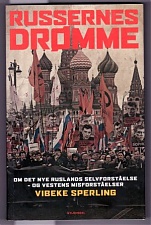Baltic States – CIS, Book review, EU – Baltic States, Latvia, Russia
International Internet Magazine. Baltic States news & analytics
Saturday, 27.04.2024, 03:30
Dreams and realities: another attempt to understand Russia’s soul
 Print version
Print version |
|---|
For the BC’s readers – CEO’s & decision makers- any such publications are of particular interest, as they deal with the situation in the Baltic States’ biggest neighbor. Suffice it to say that for about half a century the three Baltic States –during that time, USSR republics- have been under the helmet of the Soviet Union. Even now, about third of Latvians regarded themselves as Russians and Russian language is often heard in all three Baltic States. Baltic economies are closely connected to the Russian market.
The new book by the Danish prominent journalist, Vibeke Sperling*) is of special concern to readers as it aims at touching upon something relatively new: Russia’s self-perception and western misjudgments about the country’s present and future.
Revealing both issues would be of great help in doing business with Russia; in particular, through the present western economic-political sanctions and embargos. Quite notable, such sanctions have been detrimental both for the Baltic and Scandinavian states; the author, however, agrees that these sanctions did not provide an expected damaging effect on Russia. On the contrary, people have been “united with Kremlin” (p.258). It remains dubious, whether people’s connection to the central power has a negative impact.
However, as it is seen, the book is on something else: it has been inspired by the recent Russia-Ukraine conflict: the author specifically mentioned this in the book’s introduction. The “shadows of the conflict” tarnish the author’s deliberations on Russia’ modern internal and external policies.
*) Sperling V. Russernes Dromme. Om det nye Ruslands selvfortåelse- og vestens misforståelser (in Danish). –Gyldendal, 2015,-271 pp. [English translation – “Russian’s dreams: on Russia’s self-perception and western misjudgments”].
The book of such an enormously interesting subject as the big country’s “self-perception” might suggest both historic and transitional aspects of “Russian identity”. However, the author confined to the two aspects, concentrating first on (in translation) “Russia’s identity and its attitude to Europe and NATO”; and, second, on “Russia’s friends and perspectives for the future” (with the main author’s motive that “the west would help Russians on the way to democracy”, p. 230). The first part with such chapters as “Russian identity and Kremlin” and “Putin’s images” is bigger than the second with the chapters concerning Eurasian Union and Russian global friends.
The author follows a western main stream: imposing on Russian way of life and identity a western-type democracy. Such western patterns would best fit the Russian mentality. And according to the author, that type of democracy shall be simply imposed on Russia… Can’t Russians decide for themselves; or the Russian soul is not mature enough?
Oh, this “mysterious” Russian soul! So many western scholars approached that ever-attractive subject when writing about this country. The country is really very big –about 17 mln. sq.km and over 150 mln people, with enormous natural and mineral resources. This is why it has through history, and particular in modern time, attracted so much attention throughout the world. Some of the books were really volumes, both in the coverage and the length (see, e.g. The Russians, by Hedrick Smith. –The Times Books Publ., 1976.- 639 pp; and more recent one by Remnick D. “Lenin’s Tomb”.- Vintage Books, N-Y. 1994, – 588 pp.). Both books won Pulitzer Prize). A lot of additional and more fundamental things can be found there on the subjects chosen by V. Sperling…
Then, about “western misjudgments”: this notion in the title sounds rather strange from a Dane who lived and worked in both the USSR and new Russia for over the last 30 years. Can such an experienced author “misjudge” and miss-understand Russia? Hard to believe…
It is well worth mentioning that for more than 300 years Denmark and Russia has had the closest relations: a Danish princess has been the wife of the last Russian czar! Russian embassy was situated for several decades in the inner city, next to the Royal Theater. Russian Orthodox Church has had a privilege to be built in the inner city as well, next to the city’s main cathedral, the Marble Church. Russia in the eyes of Danes has been the most reliable and respected partner. What misjudgments? What has happened? Peoples’ soul doesn’t change overnight; it is subject to historic evolution! It would be very interesting to follow the paths from earlier appreciation to present misjudgment…
The author’s conclusion consists in playing with words: she is both a “pessimistic optimist” and an “optimistic pessimist”, while plausibly neglecting “optimistic optimism” considering Russian issues in the coming years (p. 258). Thus, the book adds to numerous other publications with “all-sides” criticism on Russian way of life. The public and the business in the Baltics, however, would rather have a perspective vision based on a constructive dialogue with the trading partner along the eastern borders.








 «The Baltic Course» Is Sold and Stays in Business!
«The Baltic Course» Is Sold and Stays in Business!

